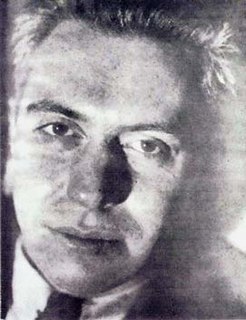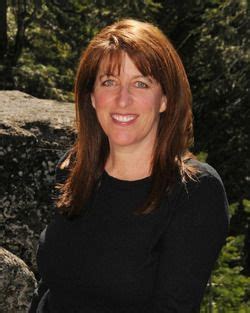A Quote by Hart Crane
And so she comes to dream herself the tree, The wind possessing her, weaving her young veins, Holding her to the sky and its quick blue, Drowning the fever of her hands in sunlight. She has no memory, nor fear, nor hope Beyond the grass and shadows at her feet.
Related Quotes
When the soul is naughted and transformed, then of herself she neither works nor speaks nor wills, nor feels nor hears nor understands; neither has she of herself the feeling of outward or inward, where she may move. And in all things it is God who rules and guides her, without the meditation of any creature.... And she is so full of peace that thought she pressed her flesh, her nerves, her bones, no other thing come forth from them than peace.
I found her lying on her stomach, her hind legs stretched out straight, and her front feet folded back under her chest. She had laid her head on his grave. I saw the trail where she had dragged herself through the leaves. The way she lay there, I thought she was alive. I called her name. She made no movement. With the last ounce of strength in her body, she had dragged herself to the grave of Old Dan.
Where woman has taken her place in business she has found her method ready-shaped for her, and following that, she does her work,if with a certain amount of monotony, yet without undue fatigue. Her hours are fixed, and as a rule she gets needful change of scene as she goes to her business and returns to her home or the place where she lives. But the "home- maker" has not, nor can she have, any such change, and her hours are always from the rising of the sun beyond the going down of the same.
Outward objects cannot take hold of the soul, nor force their passage into her, nor set any of her wheels going. No, the impression comes from herself, and it is her own motions which affect her. As for the contingencies of fortune, they are either great or little, according to the opinion she has of her own strength.
My mother didn't feel sorry for herself, she was left with no child support, no alimony at a very young age, with a child to raise, a high school education and she just figured it out. She didn't complain, she didn't rely upon government, she relied upon her own skill set, her own self confidence, her own drive in moxie and her own duty to me and her and she relied upon her family and her faith.
Little Lotte thought of everything and nothing. Her hair was as golden as the sun's rays, and her soul as clear and blue as her eyes. She wheedled her mother, was kind to her doll, took great care of her frock and her red shoes and her fiddle, but loved most of all, when she went to sleep, to hear the Angel of Music.
Satire, whilst envy and ill-humor sway
The mind of man, must always make her way;
Nor to a bosom, with discretion fraught,
Is all her malice worth a single thought.
The wise have not the will, nor fools the power,
To stop her headstrong course; within the hour
Left to herself, she dies; opposing strife
Gives her fresh vigor, and prolongs her life.
The images were gone, but Calvin was there, was with her, was part of her. She had moved beyond knowing him in sensory images to that place which is beyond images. Now she was kything Calvin, not red hair, or freckles, or eager blue eyes, or the glowing smile; nor was she hearing the deep voice with the occasional treble cracking; not any of this, but - Calvin. She was with Calvin, kything with every atom of her being, returning to him all the fortitude and endurance and hope which he had given her.
He didn't see anything." She rolled to her feet. "I was in your bed! We could have scarred him for life!" "Grace, we weren't doing anything. Well, I wasn't. You were snoring." "I don't--" She smoothed her dress down and searched out her sandals, shoving her feet into them. She glanced at herself in the mirror over his dresser and groaned. Hair, wild. Lips, swollen. Face, flushed. Nipples, hard. "Dammit!" She clapped her hands over them. "It's like they're broken!
The magnificent thing about her [Amelia Earhart] is, in the eyes of the world, she simply never died. Her fear never witnessed, her failure never recorded, her shiny twin-engine Electra never recovered. Earhart's legacy of inspiration is amplified because her adventure is perpetual. We don't think of her as dead; we think of her as missing. She is forever flying, somewhere beyond Lae, over that limitless blue horizon.
The universal nature has no external space; but the wondrous part of her art is that though she has circumscribed herself, everything which is within her which appears to decay and to grow old and to be useless she changes into herself, and again makes other new things from these very same, so that she requires neither substance from without nor wants a place into which she may cast that which decays. She is content then with her own space, and her own matter, and her own art.
But she did not take her eyes from the wheels of the second car. And exactly at the moment when the midpoint between the wheels drew level with her, she threw away the red bag, and drawing her head back into her shoulders, fell on her hands under the car, and with a light movement, as though she would rise immediately, dropped on her knees. And at the instant she was terror-stricken at what she was doing. 'Where am I? What am I doing? What for?' She tried to get up, to throw herself back; but something huge and merciless struck her on the head and dragged her down on her back.






































